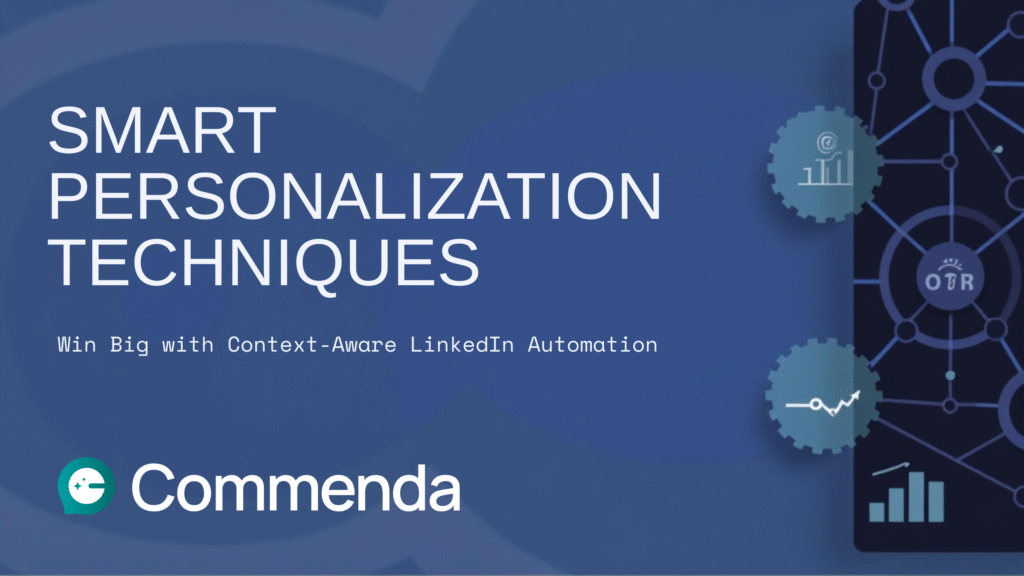Smart Personalization Techniques: Win Big with Context-Aware LinkedIn Automation

Table of Contents
Smart Personalization Techniques: Win Big with Context-Aware LinkedIn Automation
Automation doesn’t mean robotic. In fact, the best LinkedIn automation tools are the ones that feel completely human.
Personalization is the secret ingredient that sets successful outreach apart from spammy noise. When combined with timing, context, and intelligent targeting, personalization becomes a force multiplier for:
Connection acceptance rates
Response and conversion rates
Trust and rapport building
And yes—you can scale this with the right tools.
Why Personalization is the Heart of LinkedIn Automation
According to LinkedIn Sales Solutions, personalized InMail messages get 15% higher response rates.
Even simple changes like:
Adding the prospect’s first name
Mentioning mutual connections
Referencing their recent post or company
…can dramatically increase effectiveness.
LinkedIn automation software should allow this level of customization—otherwise, it’s not worth using.
Basic vs Smart Personalization: What’s the Difference?
Basic Personalization:
First name token
Company name merge
Job title reference
Smart Personalization:
Referencing specific content (latest post, poll, article)
Custom comments based on industry or persona
Tone-adjusted messaging (friendly vs formal)
Reacting to real-time behavior (likes, shares, comments)
This is where AI-powered solutions like Commenda shine.
Techniques to Personalize Messages, Comments & Likes
Dynamic Tokens: Use fields like name, title, industry, or location in your outreach templates.
Post-Aware Comments: Automatically like/comment on a user’s most recent post (via Expandi or Commenda).
Drip Personalization: Gradually increase message personalization as your conversation deepens.
Custom CTAs: “Saw your post about GenAI—want to discuss how Commenda handles content generation in your domain?”
These increase engagement while protecting against the dreaded LinkedIn automation ban.
Leveraging Context: The Real Personalization Multiplier
Context-based personalization means using recent activity or shared history to guide your outreach.
Examples:
Mentioning a post they liked or commented on
Referencing mutual group membership
Tailoring messaging to their job change or promotion
Use Sales Navigator + automation tools to gather context. Then plug it into your sequences.
Tools That Enable Intelligent Personalization
The best LinkedIn automation tools with strong personalization features include:
These support conditional logic, spintax, real-time scraping, and custom triggers.
How Commenda Makes Personalization Seamless
Commenda brings personalization to a whole new level:
AI-generated messages with tone, context, and behavior alignment
Auto-personalized comments on posts and polls
Real-time activity-based triggers
Prospect scoring for deeper engagement over time
Whether you’re automating LinkedIn lead generation, LinkedIn connection requests, or LinkedIn outreach messaging, Commenda adapts your voice and message contextually.
Common Mistakes to Avoid
Overusing the same template (triggers filters)
Using placeholders that don’t resolve properly
Ignoring user behavior or changes in role
Not updating sequences over time
Avoid “Hi {first_name}, saw your profile and thought to connect…” on repeat.
Frequently Asked Questions (FAQs)
Spintax is rotating phrase templates; personalization is tailoring based on user data.
Yes, but it’s manual. Tools like Commenda save hours with scalable personalization.
Every 2–3 weeks or when campaign results drop.
Not if delays, variability, and content relevance are built in (Commenda does this).
Absolutely. Commenda auto-generates relevant comments based on content themes.
Conclusion
LinkedIn automation without personalization is just digital spam.
To automate LinkedIn messages, automate LinkedIn outreach, or automate LinkedIn comments at scale and still sound human—you need smart personalization.
👉 That’s where Commenda steps in—automating engagement that feels handcrafted, not copy-pasted.